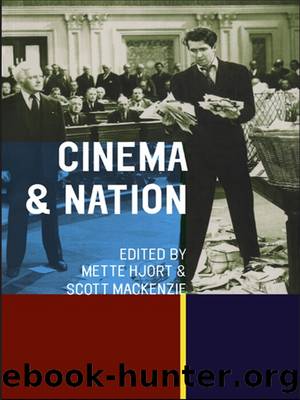Cinema and Nation by Mette Hjort

Author:Mette Hjort
Language: eng
Format: epub
Tags: ebook
Publisher: Taylor and Francis
Published: 2011-08-24T00:00:00+00:00
The Channel 4 effect helped generate the economic and cultural conditions which led to a number of feature films being made in Scotland, telling distinctively Scottish stories. During its first year of operations, five features set in Scotland were commissioned and broadcast by the Channel. This first group included Hero (Barney Plats Mills, 1982), the first feature made in the Gaelic language, Living Apart Together (Charlie Gormley, 1982), Scotch Myths (Murray Grigor, 1982), Ill Fares the Land and Another Time, Another Place (Mike Radford, 1983). However, this rapidly appeared to be something of a false dawn, with only one major commission during the next six years, Charlie Gormleyâs Heavenly Pursuits (1986). But the decade ended with a second miniwave of Scottish productions including Play Me Something (Timothy Neat, 1989), Venus Peter (Ian Sellar, 1989) and Silent Scream (David Hayman, 1990), all three projects developed by the British Film Institute with significant financial support from Channel 4. These were complemented by The Conquest of the South Pole (1989), a feature fully funded by the Channel which was also the feature debut of Gillies Mackinnon, soon to become one of the most prolific directors in British cinema throughout the 1990s.
While Channel 4 created unprecedented creative opportunities for Scottish filmmakers, it did not create the conditions for a viable and sustainable Scottish cinema. The basic problem was one of continuity. In some years several projects might be realised, while in othersâ1987 and 1988 for exampleâno Scottish films were commissioned. One of the reasons behind this was that Channel 4 had no special brief to promote Scottish cinema and Scottish projects had to compete with the rest of the British independent production sector in chasing what were actually quite limited funds. It was also increasingly rare for Channel 4 fully to fund any feature and so other sources of production finance became more and more crucial. The BFI were helpful in this respect but again their raison dâêtre was British cultural film-making in its broadest sense. What was required was a different kind of institutional intervention geared towards the nurturing of a continuity of Scottish feature-film production.
Download
This site does not store any files on its server. We only index and link to content provided by other sites. Please contact the content providers to delete copyright contents if any and email us, we'll remove relevant links or contents immediately.
Still Foolin’ ’Em by Billy Crystal(36352)
Spell It Out by David Crystal(36113)
The Great Music City by Andrea Baker(31919)
Professional Troublemaker by Luvvie Ajayi Jones(29651)
Trainspotting by Irvine Welsh(21645)
Call Me by Your Name by André Aciman(20502)
The Secret History by Donna Tartt(19061)
We're Going to Need More Wine by Gabrielle Union(19038)
Cat's cradle by Kurt Vonnegut(15340)
Ready Player One by Cline Ernest(14651)
Molly's Game by Molly Bloom(14137)
Bombshells: Glamour Girls of a Lifetime by Sullivan Steve(14062)
The Goal (Off-Campus #4) by Elle Kennedy(13658)
Leonardo da Vinci by Walter Isaacson(13320)
4 3 2 1: A Novel by Paul Auster(12377)
The Social Justice Warrior Handbook by Lisa De Pasquale(12188)
The Break by Marian Keyes(9359)
Crazy Rich Asians by Kevin Kwan(9281)
The remains of the day by Kazuo Ishiguro(8982)
